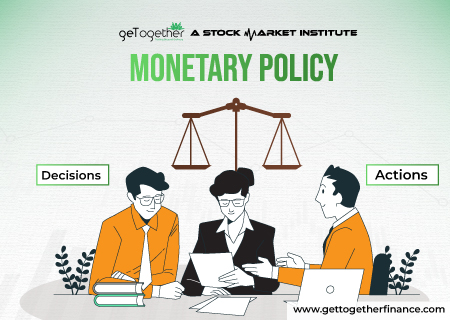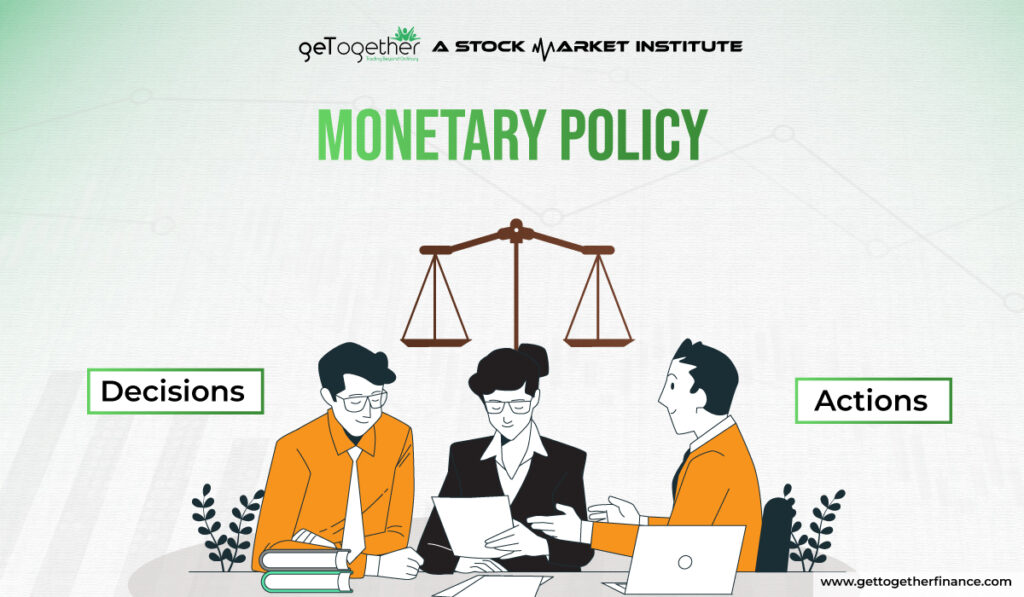All About Monetary Policy: Impact on the Stock Market
- August 13, 2024
- 1751 Views
- by Manaswi Agarwal


Monetary Policy as the name itself refers to the policies implemented by the central banks to control the overall supply of money. Monetary policy is a mechanism which is used to promote economic growth with tools like interest rates and changing bank reserve requirements. An economy is maintained by increasing or decreasing the supply of money in the market which fluctuates demand of individuals.
What is Monetary Policy?
To manage the money supply and economic growth, there is a need for economic policies and monetary policy is one of them. Monetary policy is used as a powerful mechanism to regulate the macroeconomic variables such as inflation and unemployment in the economy. Policymakers implement monetary policies with the help of tools like interest rates, purchase and sale of government securities, and managing cash flow in the economy.
Objectives of Monetary Policies

The implementation of monetary policies is aimed at managing inflation, unemployment as well as currency exchange rates.
Inflation
Inflation is the situation when supply of money in the market increases, causing higher flow of money in the market and increasing expenditures in the economy. The supreme objective of monetary policies is to target inflation as it requires it to be kept on low levels. In cases of high level inflation the use of monetary policy can manage the supply of money.
Unemployment
The level of unemployment can be managed with the use of monetary policies by expanding money supply in the market as it would stimulate business activities as well as be helpful in creating job opportunities for people.
Currency Exchange Rates
The central bank regulates the exchange rates between the domestic and foreign currencies. The money supply can be increased by the central bank to issue more currency wherein the domestic currency becomes cheaper in relation to the foreign currency.
Types of Monetary Policy

Monetary policy is one of the determinants of economic growth since it regulates the money supply and the rate of interest. These policies can be positioned as either expansionary or contractionary depending on the condition of the economy.
Contractionary Monetary Policy: Damping Inflation
The central bank uses a contractionary monetary stance when there is a rise in inflation and the central bank aims to restrain an overheating economy. This policy increases interest rates which limits the supply of money available by making borrowing more costly. The outcome is that both consumers and corporations will spend less thereby curbing inflation.
Assume it is like restraining inflation like controlling the speed of a car using brakes. When the car reaches a certain speed, it becomes dangerous. The same is true with an economy: hyperinflation or asset bubbles burst when there are too few constraints put on expenditure.
Expansionary Monetary Policy: Economic Growth Overview
Conversely, during periods of slow economic growth or a full-blown recession, it becomes necessary to introduce an expansionary monetary policy. An expansionary policy is when the central bank lowers the rate of interest making savings less attractive and encouraging spending more favorable. It is in this way that businesses invest more, consumers increase their expenditure, and consequently, the overall level of economic activity increases.
It is sensible to think about an economy as a car running low on petrol: an expansionary economic policy is the same as an accelerator. An expansionary policy is not only about increasing investments and increasing spending, but also returning the economy to its active state.
The goal in all two policies is to manage the economy in such a way as to control growth and inflation. This will ensure there is long-term economic growth as well.
How Often Does Monetary Policy Change?

Policies concerning money are not set in stone; they are modified according to a country’s economy. In most cases, central banks have a cycle in which they review and modify the policy, which is usually after a few months. The Reserve Bank of India, for example, has a Monetary Policy Committee (MPC) meeting every two months which aims to modify policy after considering inflation, GDP growth, and other important variables that have an impact on decision-making.
Monetary policy is reviewed by the Reserve Bank of India every two months (bi) which adds up to six times in a year. The Committee is integrated under the Central Government’s authority and is set up as per section 45ZB, of the Reserve Bank of India Act and their primary task is to set the policy interest rate that is sufficient to maintain the target inflation level.
During unforeseeable events such as a financial crisis or inflation, central banks have the ability to alter monetary policies more frequently. Most fiscal and economic factors such as interest rates, inflation, and employment rates influence this decision.
To be simple, we can say that the economy is steadily growing because monetary changes are made as frequently as possible.
Tools to Implement Monetary Policy

But how does monetary policies are implemented in the economy? Central banks influence the money supply by managing interest rates and credit conditions, and the primary tools used to manage the economy are:
Interest Rates Policies
Central banks influence overall economic activity by fluctuating interest rates. A reduction in the interest rates lowers borrowing costs which gives a boost to spending and investment and hence result in enhancing economic growth. An increase in the interest rates restricts spending and investments as the borrowing costs get increased to control inflation.
Repo Rate: The rate at which the central bank lends money to the commercial banks in exchange for securities.
Reverse Repo Rate: The rate at which the central bank borrows money from the commercial banks by selling securities.
Open Market Operations
Government securities are bought and sold in the open market in order to regulate money supply in the economy. To stimulate economic activity, the securities are bought in the open market which results in increasing the money supply and lowering interest rates. On the other hand to cool down the economy, securities are sold which decreases the money supply and raises interest rates.
Reserve Requirements
It is mandatory for the central bank to maintain a minimum amount of reserve balance against the deposits. If the bank lowers the reserve requirements then it results in expanding the money supply because the banks can lend more money. While higher reserve requirements contract the money supply in the market.
Discounted Interest Rates
Discount rate is charged by central banks from commercial banks and other depository institutions for the loans granted to them. Central bank decreases the discount rate to encourage banks to increase their borrowing which would increase money supply in the market and vice versa for the higher discounted rate.
Exchange Rate Interventions
Foreign currencies are bought or sold to influence the exchange rates which stabilize the value of national currency that affects overall economy, inflation as well as trade balance.
Also Read: Fiscal Policy
How do monetary policies affect the stock market?

Monetary policies can have a significant impact on an investor’s portfolio and net worth as any changes in monetary policies affect the operations of financial instruments. Low interest rates or expansionary policies by the central banks will result in encouraging more investments, stock prices will suddenly pick a rally with a decrease in interest rates and hence boost investment and vice versa during contractionary policies. Investors can manage their portfolios as per the implementation of monetary policies according to their risk tolerance and investment horizon.
Importance of Monetary Policy

Monetary plays a crucial role to stabilize overall growth of the economy as it controls the supply of money in the market. Let us explore how important is it for an economy to implement monetary policies:
- Central bank promotes economic growth through interest rates and open market operations which influences overall economic activity of the country.
- Implementing monetary policy aims to influence employment by stimulating investment in the business and increasing consumer spending.
- Monetary policy has a great impact on a country’s exchange rate which affects international trade. Higher interest rates aim to attract foreign investments which appreciate national currency.
- Central banks can stabilize financial systems as they act as a lender of last resort during a financial crisis and hence ensure liquidity in the banking system.
Drawbacks of Monetary Policy

Instead of the advantages that monetary policies offers in an economy, there are also some drawbacks which must be well understood:
Uncertainty
The policies need to be implemented at the right time as the economy is impacted by a number of variable factors which makes it difficult for the policymakers to understand the monetary policies that can stabilize the activities. Moreover, an unforeseen event like financial crisis, natural disasters or geopolitical events disrupts the economic forecasts.
External Influences
Capital inflows and outflows affect the currency which can undermine domestic monetary policy. Economic factors of other countries like recession can also have an impact on the domestic economy according to which monetary policies are required to be altered.
Political Pressures
Political pressures sometimes indulge in the decision making of central banks which leads to complications in implementing the monetary policy. Political interference in the economy or towards the decision making of central banks affect the decisions that lead to changes in policy implementation.
Structural Issues
While implementing monetary policies, structural problems such as labor market rigidities and productivity issues must be monitored. Public and private debt also results in limiting the efficiency of monetary policies.
Fiscal Policy Vs Monetary Policy

Fiscal policy and monetary policy are understood to be the same but both of them are different from each other in many ways:
| Basic | Monetary Policy | Fiscal Policy |
| Objective | Stability of an economy | Growth of an economy |
| Impact on Exchange Rates | Exchange rates improve when interest rates are high. | No impact on exchange rates. |
| Controlled By | Central Bank | Ministry of Finance / Government |
| Measures | It measures the interest rates for lending money in the market. | It measures capital expenditures and taxes of an economy. |
| Targets | Inflation | No Specific target |
Summing it up…
To conclude, monetary policy is a mechanism which is used by the central banks to control inflation by focusing towards the growth of the economy. To maintain smooth movement of the economy, it is necessary to effectively implement fiscal as well as monetary policy.
FAQs
What is Monetary Policy?
Monetary policy is an economic policy which is used to control the inflation, money supply and overall economic activity of the country. Central bank is mainly responsible for controlling such situations in the economy.
What is the primary objective of monetary policy?
The primary objective of implementing monetary policy is to target inflation and manage the supply of money in the economy.
What are the tools of monetary policy?
The primary tools of implementing monetary policy are Open Market Operations, Bank reserve Rates, Exchange rate, Repo rate , reverse repo rate, etc.
What are the benefits of Monetary Policy?
Monetary Policy helps to maintain money supply in the market through an economy that can be stabilized. Additionally, exchange rates are also maintained at optimized levels.



 Instagram
Instagram 
